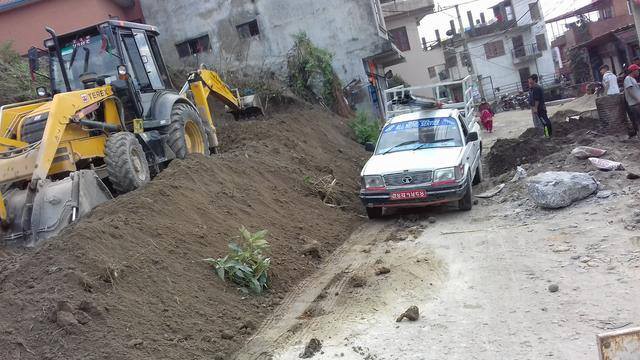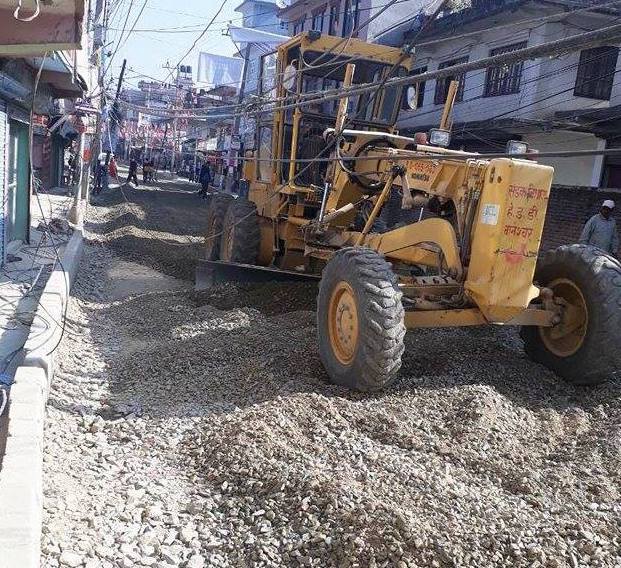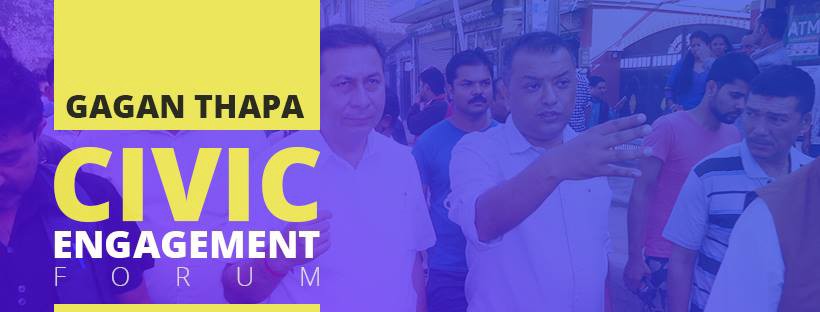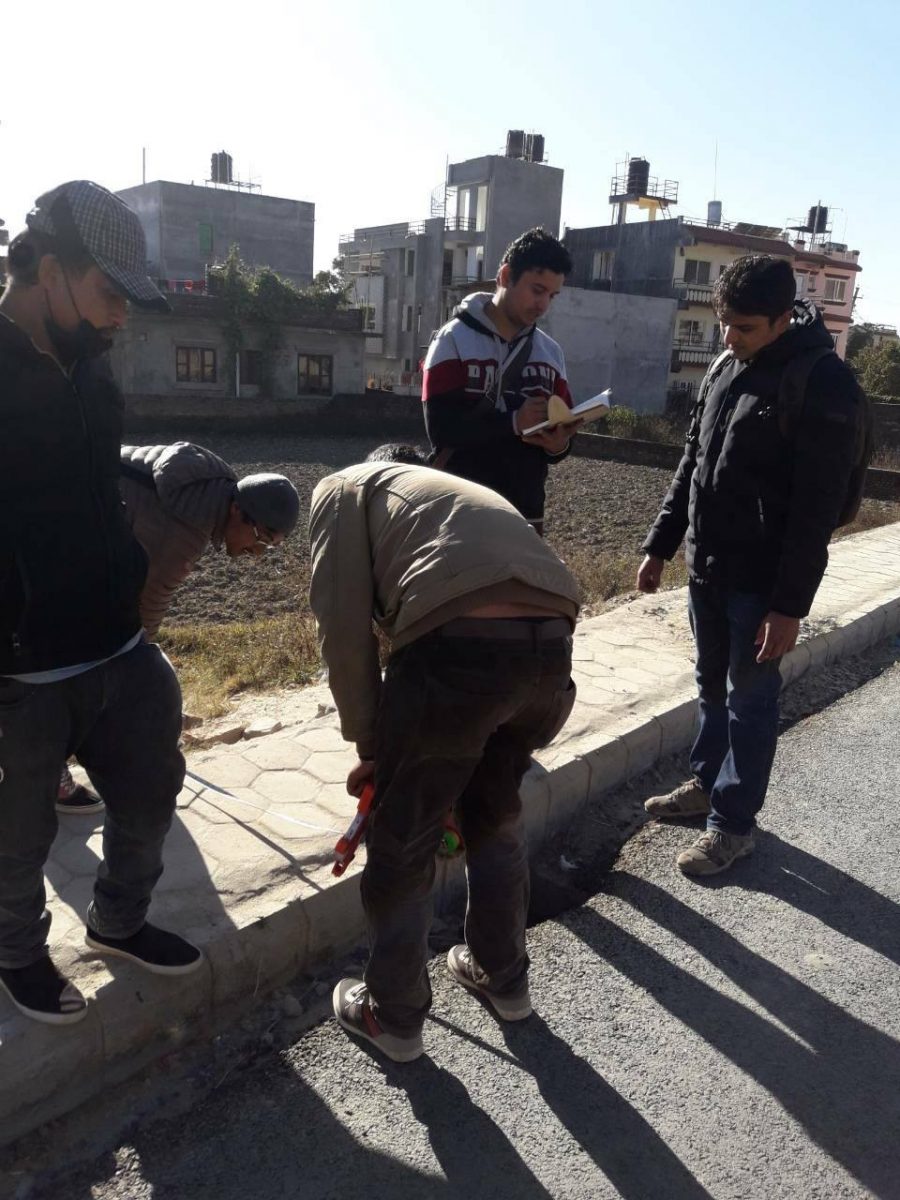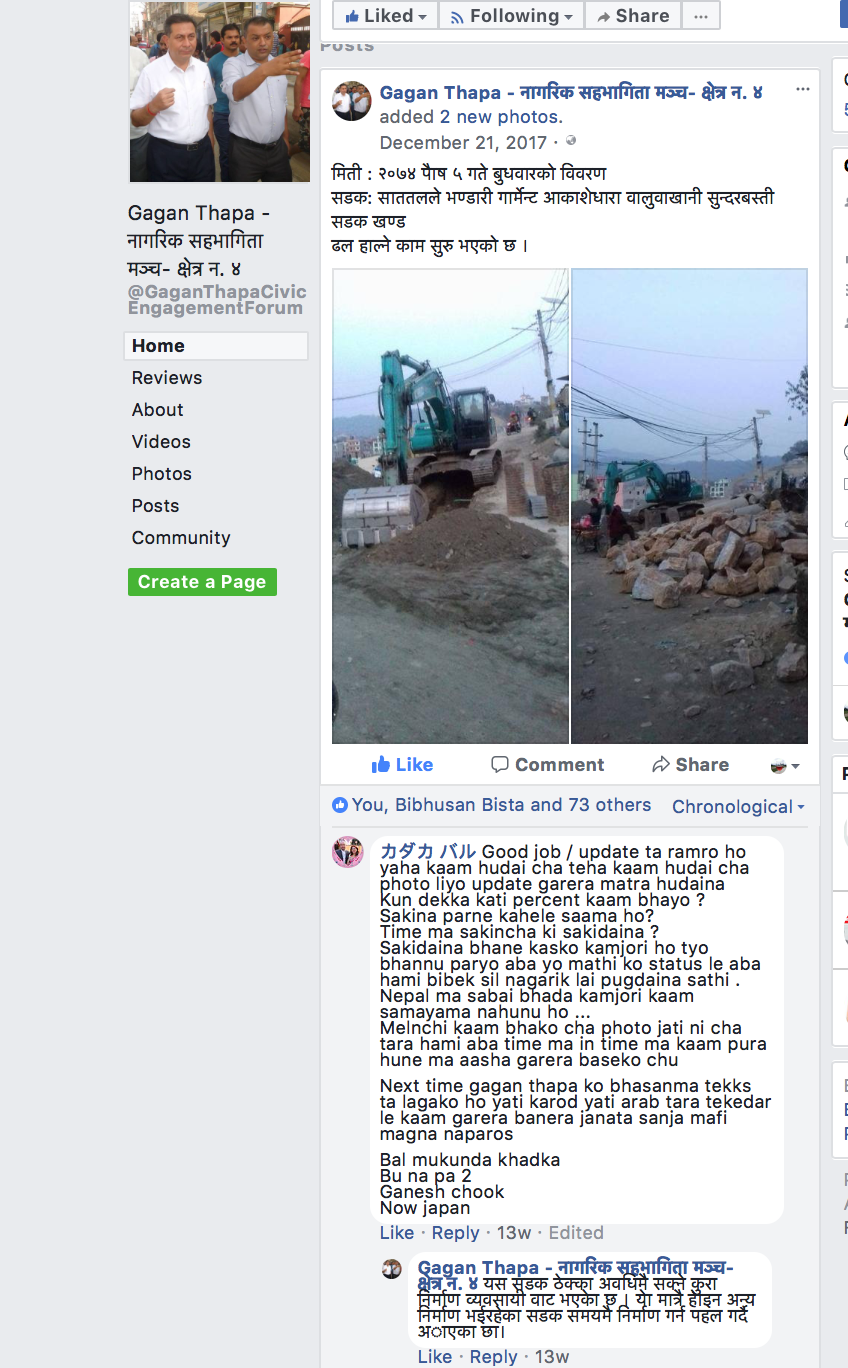This post was first published on YoungInnovations blog as Civic engagement and monitoring of urban infrastructure development using public procurement data. YoungInnovations is a technology company that creates innovative and powerful solutions to global development problems.

Relevance: Procurement and Roads Sector
A large and significant portion of public fund, 60–70% of the annual budget in Nepal, is now spent through process of public procurement and related laws. While the system of public procurement is designed to embrace and interface with competitive market environment that leads towards better ‘value of money’, the very interface of multiple stakeholders and participants in the public procurement makes it vulnerable to corruption and misuse.
Current effort of the Government of Nepal involve the introduction of electronic government procurement system ensure a single platform to publish tender notice, receive bids, evaluate, award and execute contracts. Public Procurement Monitoring Office (PPMO) is the key agency to manage the system.
Similarly, the PPMO led transparency initiative is evident through its Public Procurement Information Portal (PPIP) which is an attempt to standardize and publish procurement data into Open Contracting Data Standard.
Why Road Projects ?
Inefficiency in public sector road construction has been one of major impediments of urban development in Nepal. It takes months (often years) to complete a road of few hundred meters of length. This delay brings together other environmental pollution that has been fueling to frustration among public. We believe this inefficiency in construction is largely because of our poor procurement life-cycle and procurement methods and modality which do not encourage innovation in both contract design and construction. Hence, we intervened with roads sector procurement.

Why did the Member of Parliament take a lead?
While there are significant issues that are to be solved by efficient policies, it is required that all these issue are well informed and provided to the citizens that are directly affected by this. One of the major issues regarding procurement process in Nepal is that it does not provide a formal setup that would allow individual citizen to monitor and communicate their voices, feelings and grievances. Our effort was directed towards bridging such gaps.
Member of the Federal Parliament and Former Minister at Health Hon. Gagan Kumar Thapa has been raising concerns over the issues related to roads sector. MP Thapa also wrote an opinion on How to Improve Urban Roads Construction in papers. He identifies inefficient procurement systems as one of three major impediments in the practice and method of urban sector infrastructure development. The inefficiency is caused because of the loopholes in the Low Bid Award system in urban sector road construction in Nepal. The problem of extremely low bidding (often lower than 35% of estimated cost) is attributed to delays and questionable quality of construction. Hence he provides solutions such as possible implementation of Cost+Time bidding method (also referred as A+B method) and use of various models of Public Private Partnership (PPP) in Urban Sector Road Construction in his writing.
Also, the inefficiency in the procurement system was identified as a challenge along with possible solutions was highlighted in a Working Paper on “A brief Study on Methods and Models in Urban Sector Infrastructure Development [Thapa,Pathak,2017]” before National Planning Commission, Nepal.
Hence, with a logic to test the idea with piloting roads projects monitoring and citizens engagement, a partnership among the MP led Civic Engagement Forum, Open Contracting Partnership and YoungInnovations was made.
How did we start?
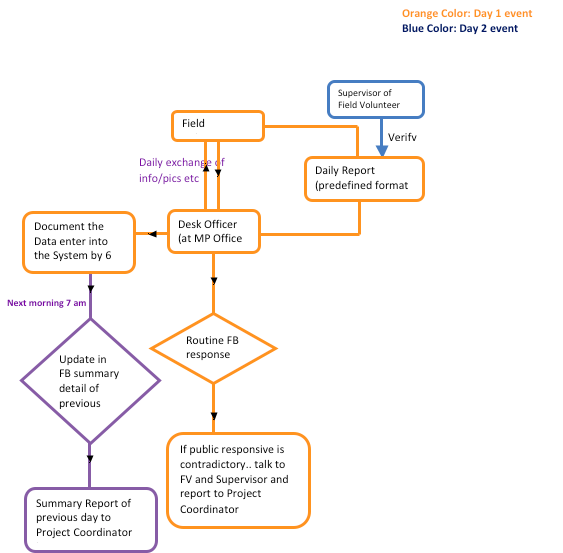
Identification projects & public procurement related data collection
We began with the selection of 12 roads projects that fall under Constituency No.4 of Kathmandu. With a few volunteers, preliminary data were collected from various sources, including the Public Procurement Information Portal, of PPMO. Notices at the project sites and concerned authorities like the Department of Roads, District Coordination Committee etc. were consulted for the purpose. Inquiries were done with a few procuring entities as well as contractors. The volunteers then used a mobile-phone based app to collect/update procurement data for the projects which were selected for monitoring.
Daily Monitoring of the physical progress and Communication through facebook
Our primary task was to design a simple yet robust system that would organize and provide a platform where citizens would be able to monitor the ongoing road construction in their community and locality. It is an exercise (also and experiment) of participatory development practice with the monitoring and evaluation portion of the developmental eco-system.
For this, we decided on using a Facebook Page as a platform of communication. Our field volunteers periodically (often daily) provide the desk office with updates and information/data from the construction site, which would be sorted and useful information would be communicated via the Facebook Page. A Response Log was created and updated thoroughly to be able to supply responses against public feedback. This enabled the common people and citizen to be acquainted with the updates and information regarding the construction practice.
Results
From public complaints to feedback
We have realized over the time that there is a significant difference between our initial objective of the program with perception of people. For we wanted to include citizens and common people to participate and engage in monitoring of road construction; in contrast the general perception was that this practice would (or should) directly and instantaneously induce speedy road construction, which it did not. In that sense we have risked a political good will with the voters of the constituency. However, such expectation is not unwarranted; we are plagued with such delays, ill-practices and wrong doings that people have strong urge to vent their frustration and expect over-night solution from the any kind of initiations that relates with development process.
But, people started checking the page for data
In three months of the first phase of the program we included a dozen of roads that were in process of construction under our civic engagement platform. It was more of our experiment with the chain of communication we designed that started with Field Volunteers relaying information through a mobile application (Kobo app) that would later — after processing the information- be updated in the Facebook page by Desk Officer. The biggest take away from our exercise has been our success in being able to acquire and transmit data; our system of communication works smoothly. Here is the log of public responses.
Enhanced Trust
The level of trust among general people towards politician in Nepal is very low; and hence any activities run by politician is seen with great skepticism.
Our civic engagement initiative is one of its first kind in Nepal that provides a platform for common people to speak their minds regarding various development and construction activities being run in their community. No politician or any elected MP, in Nepal, has ever done anything closer to what we have initiated. However, we are still in our initial days and hence a lot of work has to be done in order to gain full trust of people. The sense of skepticism and lack of trust among general people has been a major push for us to work harder to make our initiative more efficient and successful.
Use of social media was a right choice
The Facebook page along with the communication system we have designed ideally provides a platform for all of these parties to interact among themselves. As of now we have been able to connect the Office of MP and general people. Based on the comments and feedback of the people via the Facebook page, the Office of MP has been conducting programs and feedback sessions with the Public Entities and Contractors. However, we feel that Contractors and officials of PE requires to be participants in the platform we have designed.
Conclusion
Apart from lobbying for allocation of resources for local infrastructure, the role of elected representatives (other than those in executive bodies) in development-related procurement process is very minimal in Nepal. This makes the nature and content of accountability — related to local development activities- of such elected representatives very ambiguous. Initiations such as ours, that provides a platform for general people and citizens to monitor and provide their comments and feedbacks, can resolve such ambiguity of roles and accountability of elected representatives.
The civic engagement platforms like ours, in principle, can resolve the information-gap that exists among general people regarding entire developmental ecosystem. It could be designed to inform people about who is who to the processes, technicalities and policy environment. Further it can reduce and minimise the friction among Local citizens, elected representatives and Public Entities.
Bridging such information-gap -in part- is ideally a role of the local MP. And this can be done by the MP in various forms and in different platforms. The information and data on portal such as that of Public Procurement Monitoring Office (PPMO) can be overwhelming for general people, thus instead local level initiative like ours can use the data and information from the same source but in manners that is more relevant and easy-to-read. We believe that our initiative takes advantage of Open Data and information available in the PPIP portal of PPMO and makes it connected to citizen where it matters the most.
Likewise, civic engagement platforms could make further use of such data and information by making appropriate analysis and address the issues of public procurement in a holistic manner. This could be in form of visualisation of data for public consumption through charts and factsheets.
Finally, a MP should be able to make small yet significant policy level interventions and input via shadow reports, policy papers, motions in parliaments, public consultations etc. And this can be done on the basis of local level initiatives on civic engagement. For us, the first phase of this initiative was a proof that data can be used to generate evidence and establish functional connection to citizens. This practice will eventually facilitate people’s representative lin an MP to use evidence for wider policy discourse and provide solutions to infrastructure development. We are excited to have started this initiative and look forward to continuing it for even greater impact in future.
Author of this blog is a law graduate and an active civic campaigner who is helping Hon. Mr. Gagan Kumar Thapa in his civic engagement campaign. The views and opinions expressed in this blog are those of the author and do not necessarily reflect the official policy or position of the MP or any officials related to him.
-
TechLekh Awards: Best Phones of 2025 in Nepal Winners!Ooooooooooh boy, what a year it was for smartphones, even in Nepal! Phones have been…
-
TechLekh Awards: Best Tablets of 2025 in Nepal Winners!The smartphone scene in Nepal was absolutely crackling this year with constant new launches and…
-
TechLekh Awards: Best Scooters of 2025 in Nepal Winners!Scooters have played a major role in shaping everyday mobility in Nepal. They have always…
-
TechLekh Awards: Best Bikes of 2025 in Nepal Winners!Motorcycling in Nepal has always meant more than just getting from one place to another.…
-
TechLekh Awards: Best Cars of 2025 in Nepal Winners!Electric vehicles continue to dominate Nepal’s market in 2025, and Chinese manufacturers still lead the…
-
Bajaj Pulsar 150 Now With Updated Design, BS6 Engine, and Modern Features in NepalHIGHLIGHTS Bajaj Pulsar 150 price in Nepal starts at Rs. 3.14 Lakhs and goes up…
-
The Most Affordable Samsung Smartphone in Nepal Gets Expensive!HIGHLIGHTS The Samsung Galaxy A07 price in Nepal starts at Rs. 18,999 (4/64GB). The MediaTek…
-
Triumph Scrambler 400 XC Launched in Nepal with Off-Road-Focused UpdatesHIGHLIGHTS Triumph Scrambler 400 price in Nepal starts at Rs. 7.15 Lakhs and goes up…


